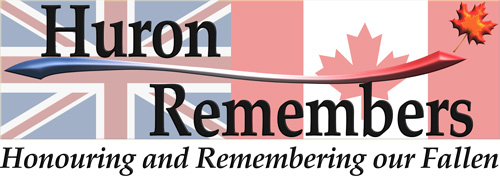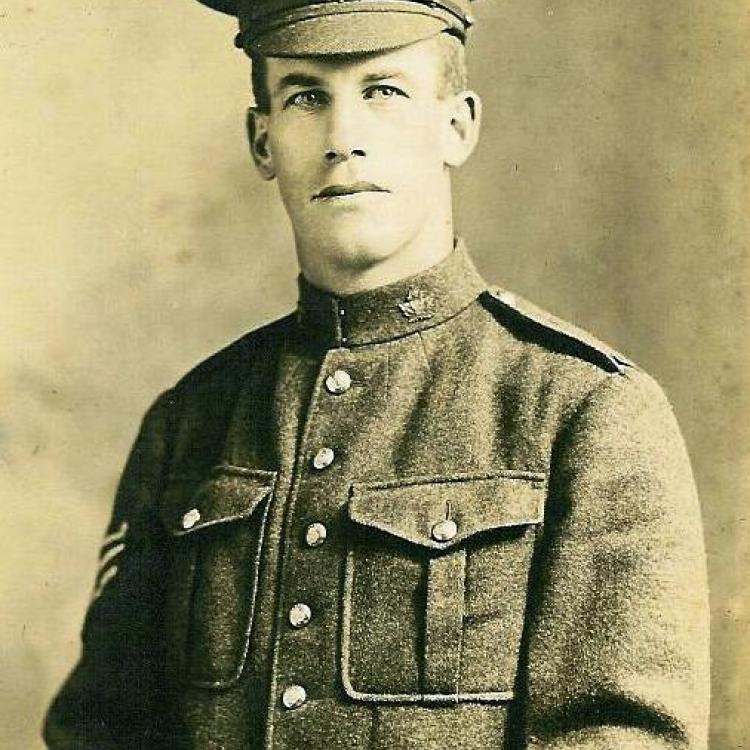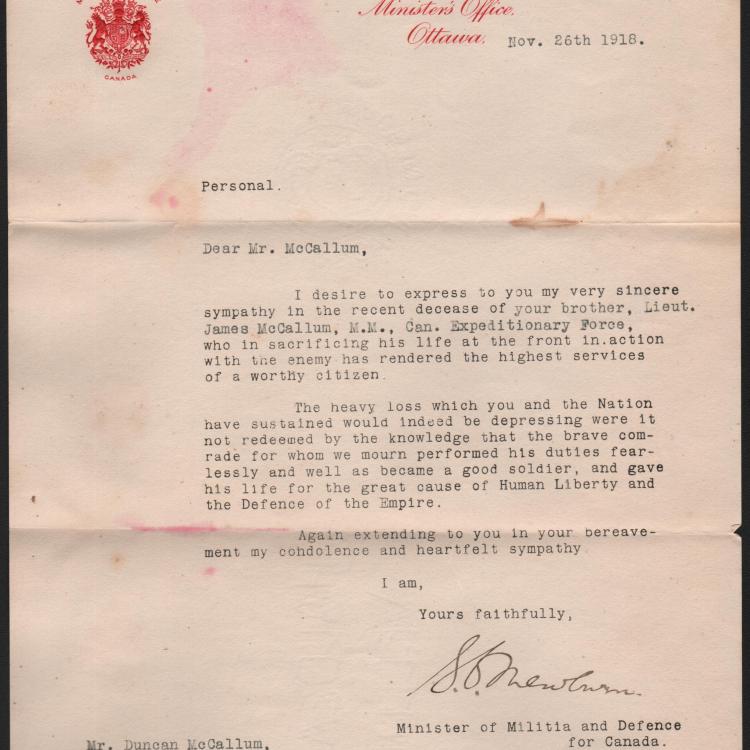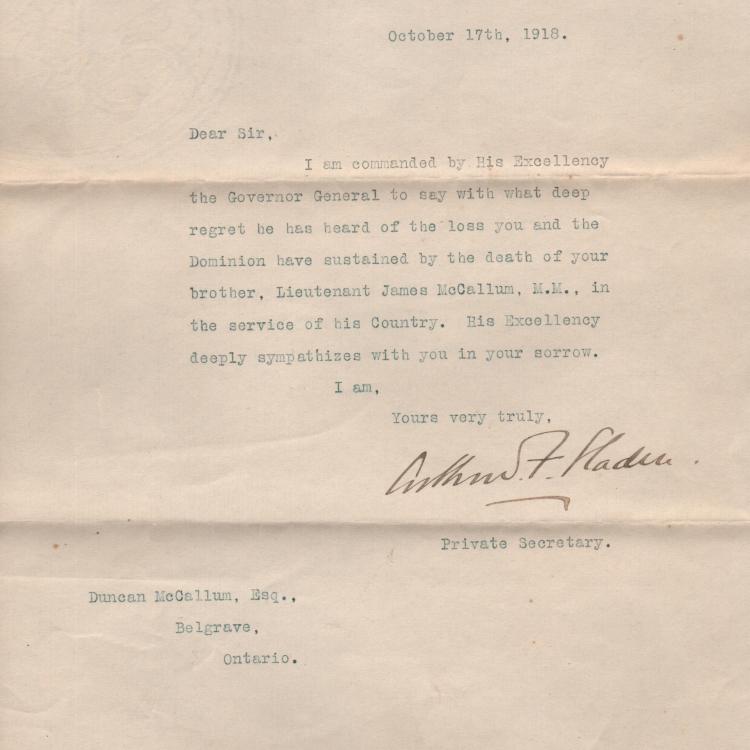McCALLUM, James
Next of Kin: Duncan McCallum, brother, Belgrave, Ontario
Occupation: Merchant
Personal Details: 5 ft. 10 in., 160 lbs., dark complexion, grey eyes, dark hair, Presbyterian
Death: October 5, 1918, buried Bucquoy Road Cemetery, Ficheux, France
Awards: Military Medal + Bar
James was the second son born to parents James McCallum Sr. and Sarah McLean, who farmed at Lot 39, Con. 8, East Wawanosh Township. In 1911, both James Sr. and Sarah died, leaving James Jr. and three of his siblings to continue the farming operation. In 1914, James and his older brother Duncan purchased the hardware store in Belgrave from Luther ‘Lou’ Williams. The firm of McCallum Bros. hardware merchants was dissolved in 1916, and James sold his interest in the business to his brother Duncan, who continued to operate it until the early 1920s. The family were active members of the Belgrave Knox Presbyterian Church, and James served for some time on the Board of Managers.
While training in London, Ontario during the summer of 1916, James quickly rose through the ranks, appointed Lance Sergeant in June, and Acting Sergeant in July. He also spent a week in the hospital during this time recovering from a case of the measles. The 161st Battalion sailed for England on November 1st, 1916 aboard the S.S. Lapland, and disembarked in Liverpool on November 11th. In mid-January Acting Sergeant McCallum was transferred to the 18th Battalion and proceeded to France. Upon arrival he reverted to the rank of Private, but this was quickly reversed, and he joined his unit in the field on January 18th, 1917. On April 30th, he was promoted to the rank of full Sergeant.
Sergeant James McCallum was awarded the Military Medal in the field on November 2, 1917. The citation read: “On August 15th 1917. For conspicuous gallantry and devotion to duty in action. This N.C.O. (non-commissioned officer) assisted an Officer to capture a minnenwerfer and its crew of 20 men he continually sniped at the enemy snipers and was instrumental in keeping down our casualties. He inspired the men of his platoon to carry on by his coolness and courage under trying circumstances on his own initiative he connected the right flank of the Company with the right Battn and in order to do this he was compelled to cross open ground much exposed to enemy rifle and machine gun fire. He kept up communication in daylight with his platoon in the rear and his work throughout the whole operation was the highest quality.”
In December 1917 Sergeant McCallum was dispatched to England where he was on command to the Cadet Training School at Bexhill for an Officers Training Course. He received his commission on March 23rd, 1918 and was appointed a temporary Lieutenant with the Western Ontario Regiment. About the same time, he learned he had been awarded a bar to his Military Medal. The citation read: “For conspicuous gallantry and devotion to duty in front of PASSCHENDAELE Nov: 9th and three following days. On his Platoon Commander becoming a casualty he took charge and rendered valuable service under trying circumstances in organising a new line after the trench had been destroyed by a heavy enemy bombardment. When a cellar shelter had been blown in by a shell he assisted in removing four wounded men and then voluntarily went back in to see that none were left. This rescue work had to be done while wearing box respirators and resulted in saving the lives of these men.”
During his time in England James McCallum sent an interesting battlefield souvenir home to his brother John in Wingham, Ontario. The Wingham Advance of January 24th, 1918 reported, “Mr. John McCallum of Belgrave, brought to town on Saturday an interesting relic of the war in the shape of a German pistol which his brother, Sergt. Jas. McCallum picked up in a German trench. The gun is a dangerous looking article and was inspected by a great many of our townspeople on Saturday.”
In early May 1918 Lieutenant McCallum was transferred to the Canadian Machine Gun Depot, and then to the Canadian Machine Gun School where he stayed until he proceeded overseas on August 18th. After making his way to the Canadian Corps Reinforcement Camp he was taken on strength by the 3rd Battalion Machine Gun Corps and reported for duty on September 15th, 1918.
The battle of Canal du Nord took place between September 27th and October 1st, 1918, and involved advancing across a narrow section of dry canal bed to attack the German defenses in front of Cambrai. The 3rd Battalion Machine Gun Corps moved into position on the evening of September 26th, and were employed in the initial creeping barrage at zero hour on the 27th. The corps moved forward in support of infantry battalions, and during the 27th and 28th were massed behind Bourlon Wood. On September 29th “A” and “B” Batteries advanced with the 1st and 2nd Canadian Mounted Rifles to establish posts along the canal in order to capture St. Olle and Neuville St. Remy. The batteries were ordered to push forward with 4 guns going with the infantry, and 4 guns kept 400 yards back for consolidation. One gun of “B” Battery encountered heavy machine gun fire from St. Olle Church and the high ground in front of them. The officer in charge, believed to be Lieutenant McCallum, and all but one man were casualties. James McCallum received gunshot wounds to the face and a fractured lower jaw in the line of duty on September 29th. He was taken to No. 33 Casualty Clearing Station where he was reported dangerously wounded, succumbing to his injuries on October 5th, 1918.




